Creating New Habits in 3 Easy Steps
This post may contain affiliate links. Please read our Disclosure Policy.
Changing or creating habits is easier said than done but it’s not impossible and is usually so beneficial. Learn how in 3 Easy Steps, you could be Creating New Habits and change your life!
H A B I T S. This word usually has a negative interpretation and it even creeps people out. But creating new habits is really that bad?
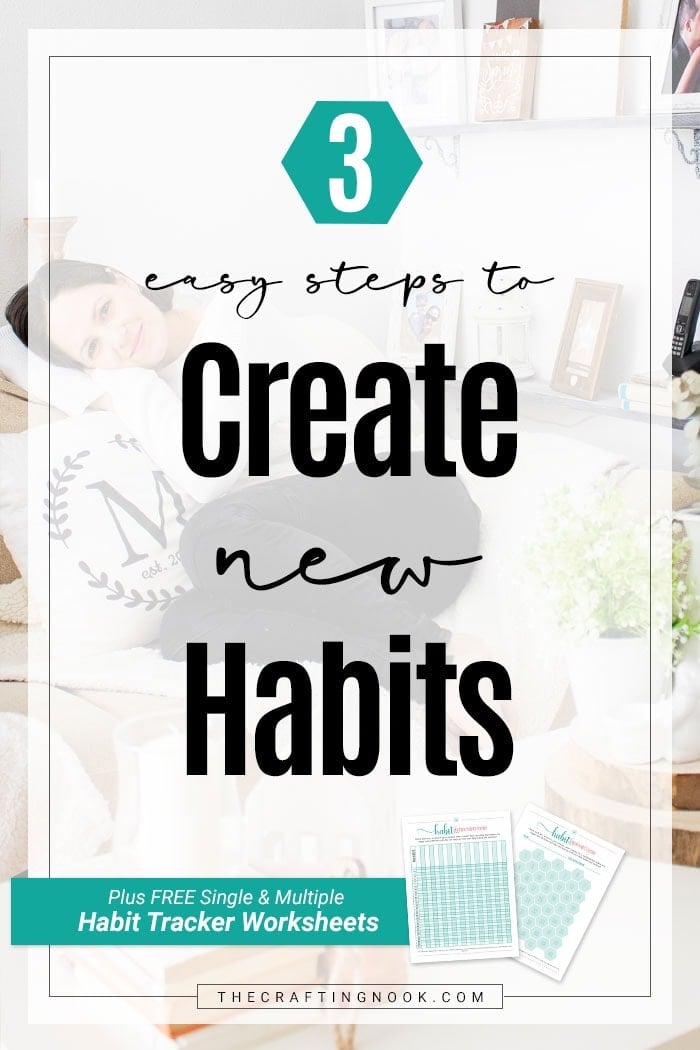
I personally think they are great and we already have a series of habits we don’t even recognize as such. Like having breakfast every single day, brushing our teeth, or throwing socks under the bed… LOL. Those are habits, good or bad but they are habits.
Truth be told we make our own habits no matter if they are good or bad. No one else is responsible or even able to set them for us.
Table of Contents
Creating New Habits is Easy with These 3 Steps
So the question is:
Can we create new habits or change existing ones?
Short answer: YES.
Let’s talk about forming new habits. We all have times in our lives when we intentionally want to change our behavior for the better and create new healthy habits for ourselves.
This could be getting in the habit of going to bed earlier, eating healthier, working out, and drinking more water. Or it could be keeping the home organized, moving more, and taking the dog for a daily walk. Or it could be work-related, spiritual, or… There are so many areas in our lives that we can improve and make easier if we created new habits.
Getting into the habit of doing something is often easier said than done.
Believe me, I KNOW!!!
We seem to acquire bad habits so easily, but getting into a “good” habit can be a little more challenging.
But here’s the thing, creating habits and routines might be hard but it’s not impossible. Once you create them things start going on autopilot. You don’t have to think hard or make any effort in order to do them.
I talked a lot about habits in my blog post How to Keep Your Home Organized. How those habits and routines can actually benefit your mental health, and make you more productive and happier. I even give an Organization Workbook for free there!
So if you are interested, jump right in!
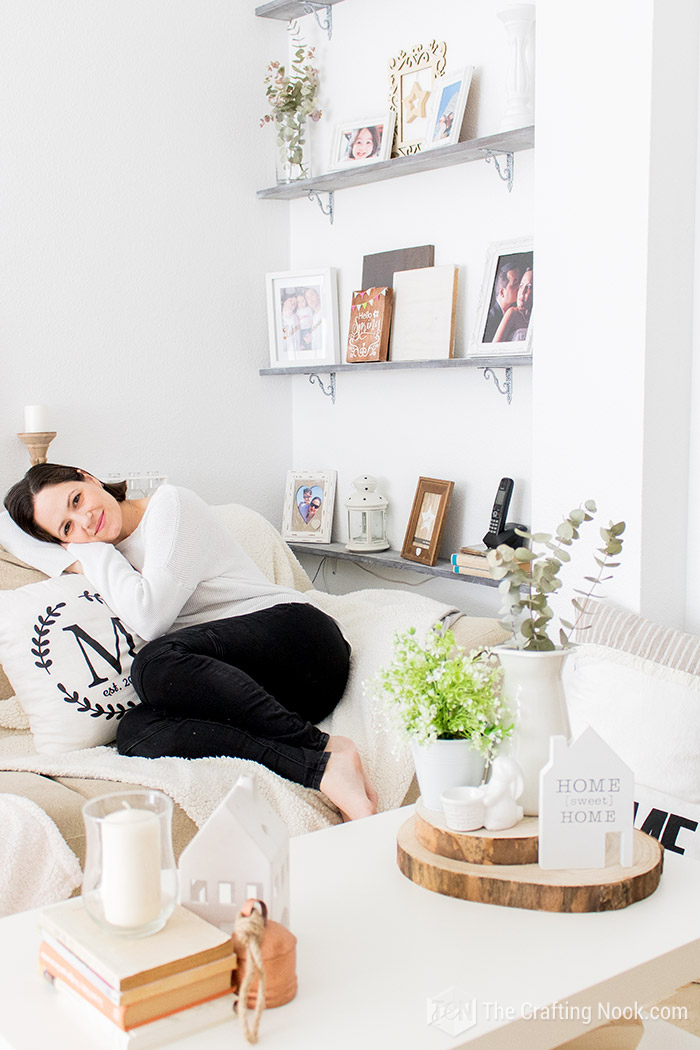
When you incorporate your new habits into your daily routine, with time, you get used to it and things start to flow smoothly and bring you a sense of accomplishment.
Of course, we need to be flexible because life happens, and sometimes what you had to do today could not be done for whatever reason. You can do it the next day or even later the same day without making a big deal of it.
But Hey!
Flexibility doesn’t mean procrastination. It doesn’t mean, “Nah, I don’t feel like it, I’ll do it tomorrow”. Flexibility means, you have a heavy headache, one of your kids got sick, and something unexpected happened that requires your attention. Otherwise, you need to stick with your routine and habits if you want your plan to work otherwise it will fail.
3 Steps to Creating New Habits
Let’s break it down into a three-step process. It will make it easy to follow until we’ve internalized the new behavior and made it a true habit. Something we do automatically without having to think about, like brushing our teeth or having our morning coffee).
1. Decide What You Want To Do
The first step is to decide what you want that new habit to be. Be as specific as possible. Don’t just tell yourself you want to exercise more. Instead, say something like “I will work out for 45 minutes every single day or 3 days a week”.
Deciding what your new habit will be and committing to when and how you’re going to do it, is half the battle.
I want to add here that it’s extremely important to make that new habit something sustainable. Because habits require willpower and willpower is not infinite when the goal isn’t sustainable.
There is an inevitable inverse relationship between habits and willpower if the goal isn’t achievable in the long term. But we will talk about this later, just keep this in mind.
2. Remind Yourself To Get It Done
The next few days should be smooth sailing. You’re motivated and excited to get this done. Sticking to your new habit isn’t an issue.
But a few days in you’ll notice that it’s not as fun anymore and it’s easy to drop it or slip back into old habits.
Maybe it’s raining and you don’t really want to go out and walk. Or maybe you just had a bad day.
This is when it’s important to remind yourself why you started this new habit in the first place and even have a daily reminder. Set an alert on your phone or add the new habit to your daily to-do list for a while.
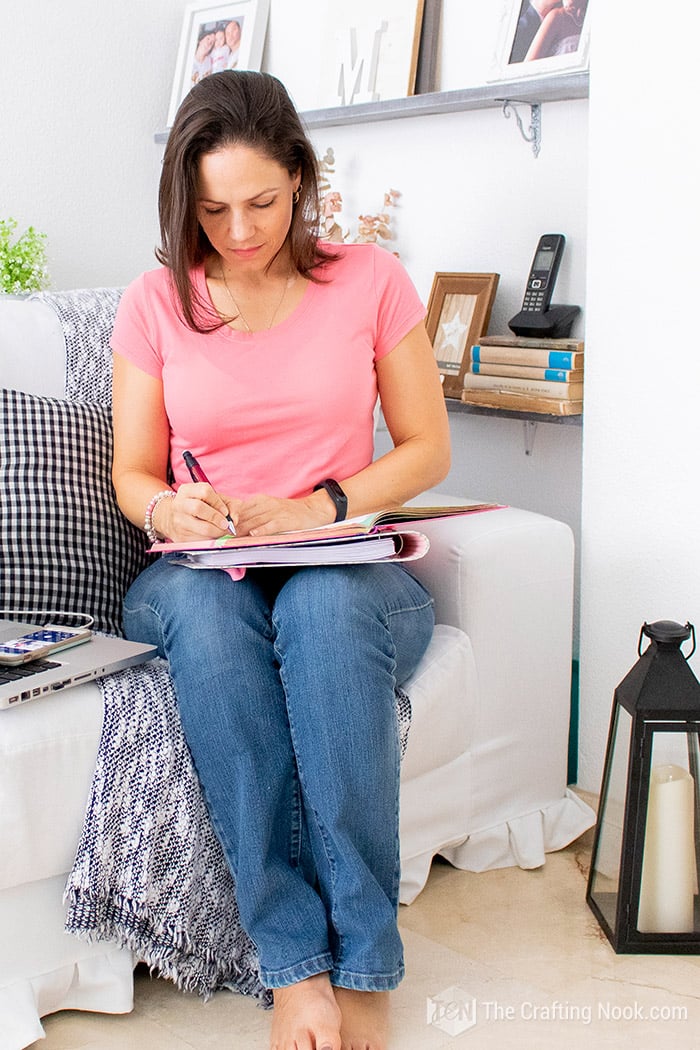
I love using a Habit Tracker to help me. In a way, it keeps s me motivated because I see my progress, how much I’ve done and how much I have to go.
It’s also important to set a reward system to keep your motivation up. It can be something as simple as “me time”.
3. Make It Part Of Your Routine Until It Becomes A Habit
This brings us to the last step. It takes some time before a new behavior becomes a true habit. Until then, a routine will work to your best advantage.
Even before the new behavior becomes automatic, a routine will help you get it done without having to spend a lot of willpower or relying on daily reminders.
I like to attach the new habit to a habit I already do automatically. For example, I was horrible at my skincare routine but I knew I needed to add that because my skin needed it. Since I have to brush my teeth every morning, I decided to do it right after that and it worked. I do my skincare routine on autopilot every morning.
Make that daily walk part of your after-dinner routine. Or change from grabbing a snack at the vending machine at work at 10:00 in the morning to packing a healthy snack or just going to the gym right after dropping kids at school.
The best way to accomplish this task is by creating many tiny habits that you can align with others that you already have automated in your brain.
It is said that it takes 21 days to create a new habit. Although the University College London found that, on average, building habits takes around 66 days for behavior change to become automatic.
In short, that means that if you commit to doing a specific task every day at the same time of day and in the same order for a long period of time, it will eventually become your habit and part of your routine. Repetition is the key to successful habit forming.
I personally decided to target 30 days and in my personal experience, it works. But it also happens that if you skip a few days the whole effort goes down the drain.
So, bottom line?
Decide to create the new habit (real and sustainable), practice the routine until it’s second nature and you’ll be well on your way to forming a new good habit.
In addition to making your habits tiny and then using an existing routine to remind you of them, is to hack your brain by calling up a positive emotion by celebrating it. Yes, Celebrate! Whether that’s fist pumps, raising your arms, doing a little dance, or singing “Shine like a Diamond” in your head. Whatever it is that helps you feel successful, that’s what will help wire in the habit.
The Inverse Relationship Between Habits and Willpower
It’s hard to keep up willpower for any length of time, that’s a fact. Yes, we can stick to a low-fat 1,000-calorie diet and go hungry for a week or two or even a month, but eventually, our willpower fades because it’s not something we can keep up with forever. And yes, we can do exercise we hate for a while… until we run out of willpower.
But what about getting up to take the kids to school every morning, brushing our teeth, or going to work every day? Those may not be our favorite things to do either, but we do them daily without the risk of running out of willpower.
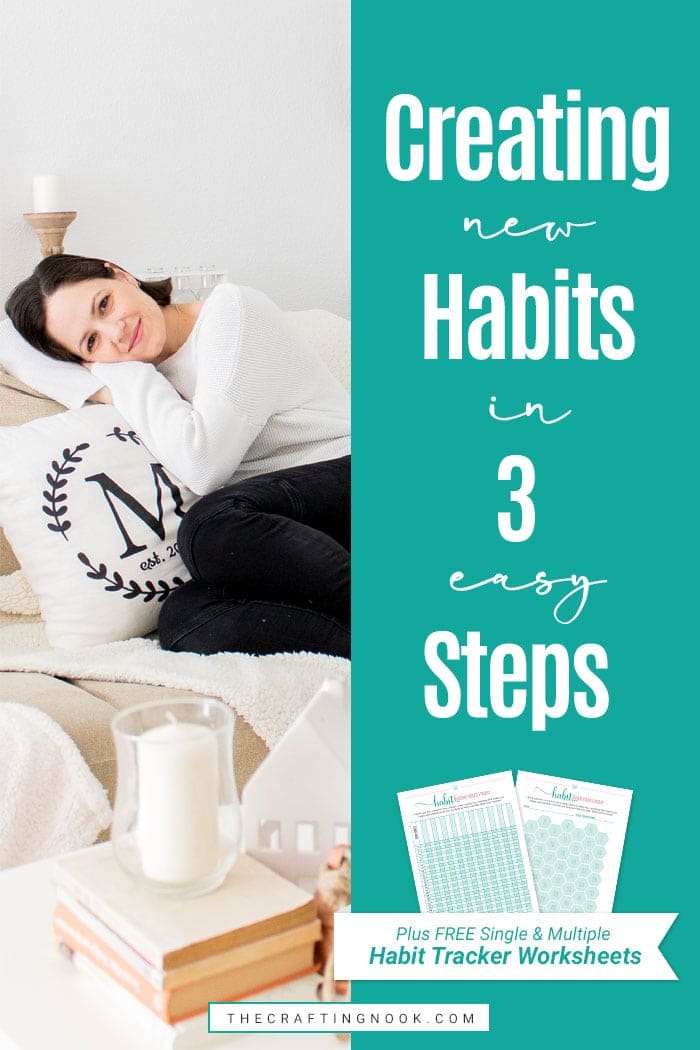
That’s because they have become habits. They are so ingrained in our lives, in what we do and who we are that we do them without even considering skipping a day or a week. We don’t have to make a conscious decision each day to shower or drive to work. It’s just what we do: it’s our habit.
When you start to think about it, there is an inverse relationship between habits and willpower. When you first want to build a new habit, it takes a lot of willpower to get it done day in and day out.
As you start to establish that habit, it becomes easier and easier to do until you don’t even have to think about it anymore.
The Key to Successfully Creating New Habit
The key is to be realistic. You know yourself better than anyone so make sure you set achievable and sustainable habits that your mind and body will be able to assume as your new normal. Otherwise, your willpower will fade and not only you will feel frustrated but you would have wasted time and effort.
Just being aware of this process helps us stick it out. We know we don’t always have to make such a big effort to go work out or skip the donut for breakfast. There is a light at the end of the tunnel. We know eventually, it will become a habit to go out for a run first thing in the morning and grab some fruit or fix some eggs for breakfast.
While we’re in that transition from willpower to habit, we can use tools to make it easier. Use a to-do list, a habit tracker (you snag a copy at the end of the post), or set a reminder to help stay on track while you are creating new habits.
Finding an accountability partner is helpful because the two of you can motivate each other and help bolster that willpower when it starts to fade after the first enthusiasm wears off. Even something as simple as laying out your running clothes the night before and keeping your sneakers by the door will make it a little easier to go out for that run.
Do what you can to help your willpower along until you have made the new behavior a true habit. After that, it’ll be easy and automatic and you’ve created a new lifelong habit.
How Long Does It Really Take To Create A New Habit?
They say it takes 21 days to create a new habit or at least that’s what I’ve heard. That’s kind of a weird idea though, isn’t it? It doesn’t take that long to form a bad habit. And sometimes no matter how hard we try it takes us a lot longer to form a new habit.
So how long does it really take to create a new habit? I would say that it depends. It depends on your mindset and it depends on how big of a change it is from what you are doing now to what you want to achieve.
If it is currently your habit to eat a bowl of ice cream at night and you switch from regular ice cream to a low-sugar frozen yogurt version, it’s probably not going to take you very long to make that new habit. Giving up ice cream altogether though or cutting out all sugar overnight, on the other hand, might take a lot longer.
It’s also true that it will be different from one person to the next and even from one habit to the next, there are a few things to keep in mind.
New Vs Old habits
It’s easier to make a new habit than get rid of an old one. Be prepared to work a lot harder to give up checking your phone every 2 minutes or snacking late at night.
Whenever possible, try to replace an old habit with a new better one. For example, if you’re wanting to give up white sugar, try switching to real brown sugar and gradually reduce the amount each week whenever you reach for your cup of tea or coffee until you no longer need sugar at all.
Habits will form faster if you stick to the same time and environment each day. Instead of going for a walk whenever, keep your sneakers next to the door and schedule your walk every day at 6 pm, right after dinner, or right after dropping off your kids at school for example.
A constant reminder of why you’re trying to change your behavior is also helpful. Remind yourself every day that you’re exercising so your body stays strong and you can go play with the kids or grandkids in the yard. Or put up a picture to remind you that you’re making frugal habits so you can one day purchase your dream home.
Keep your reason why you’re changing front and center and then be prepared to stick it out. Yes, it will take some time to make new habits and replace old ones. But it will be well worth it in the end.
But most importantly remember to reward yourself every time you see yourself already automatically doing your new habit. Believe it or not, it’s important the self-recognition and give yourself a well-deserved prize for your effort and persistence.
Have you created new habits? Did it work and how long did it take for you to make it normal?
Well, that’s it for today. I hope you enjoyed this blog post and that it inspires you to start creating new habits right away!!!
Free Habit Tracker Worksheet
I’ve created my own Habit Tracker to use whenever I need to start a new habit or change one. I have 2 versions: Single Habit Tracker and Multiple Habit Tracker.
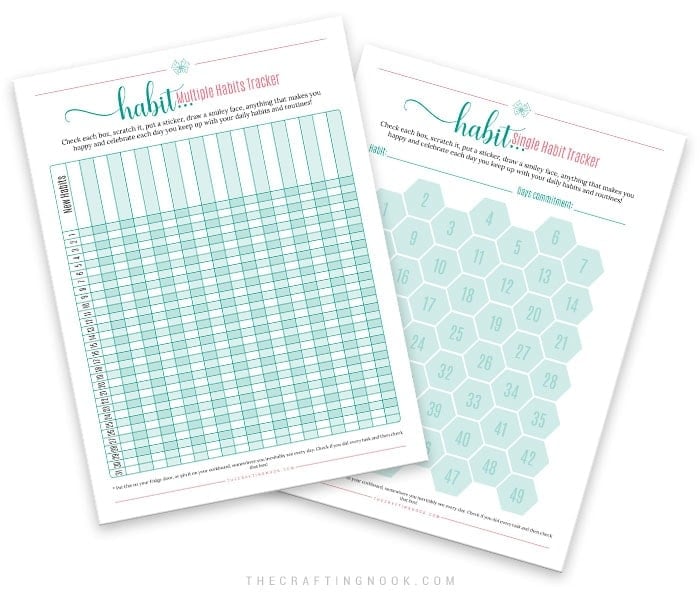
I found it more productive to manage one habit at a time so that’s why I end up creating 2 that I’m sharing with you today!
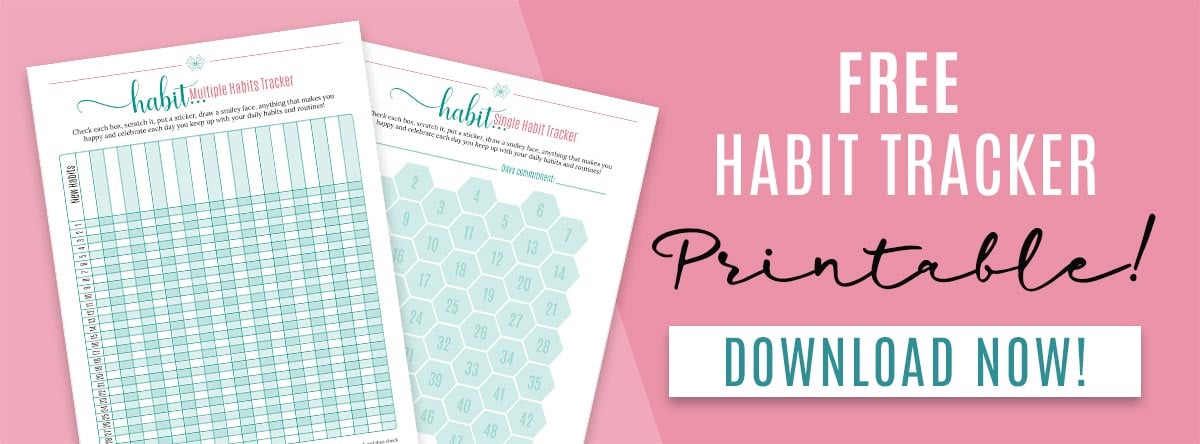
More Organization Ideas to Try
If you enjoyed learning how to create new habits article, you might also love these other organization related articles too:
These are some other tips for creating new habits from my favorite bloggers.
- 10 Daily Habits To Boost Your Mood Significantly by Layered Indulgence.
- Just 10 Simple Habits That Will Improve Your Life Instantly by Adjusting to Adulthood.
- 10 Simple Habits That Will Help You Stay Organized by Just a Girl and her Blog
Share and PIN ME!
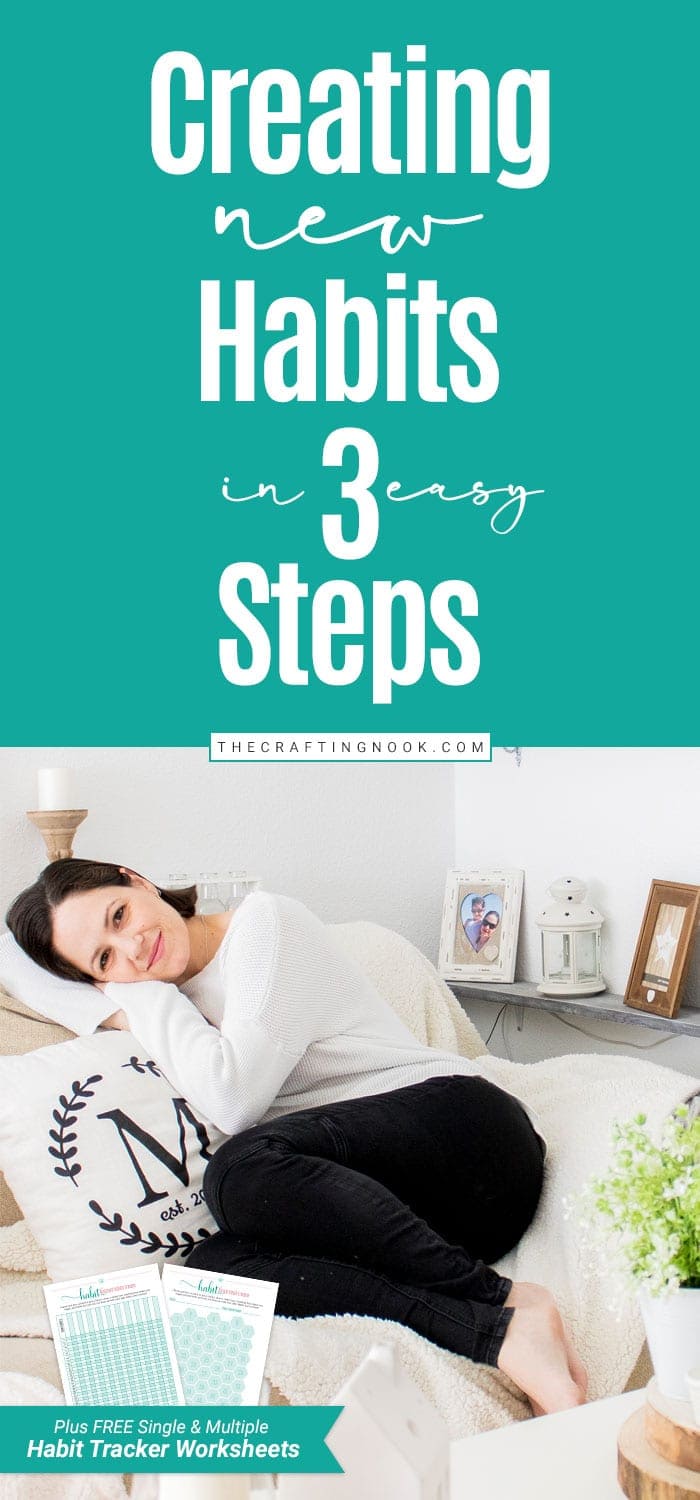
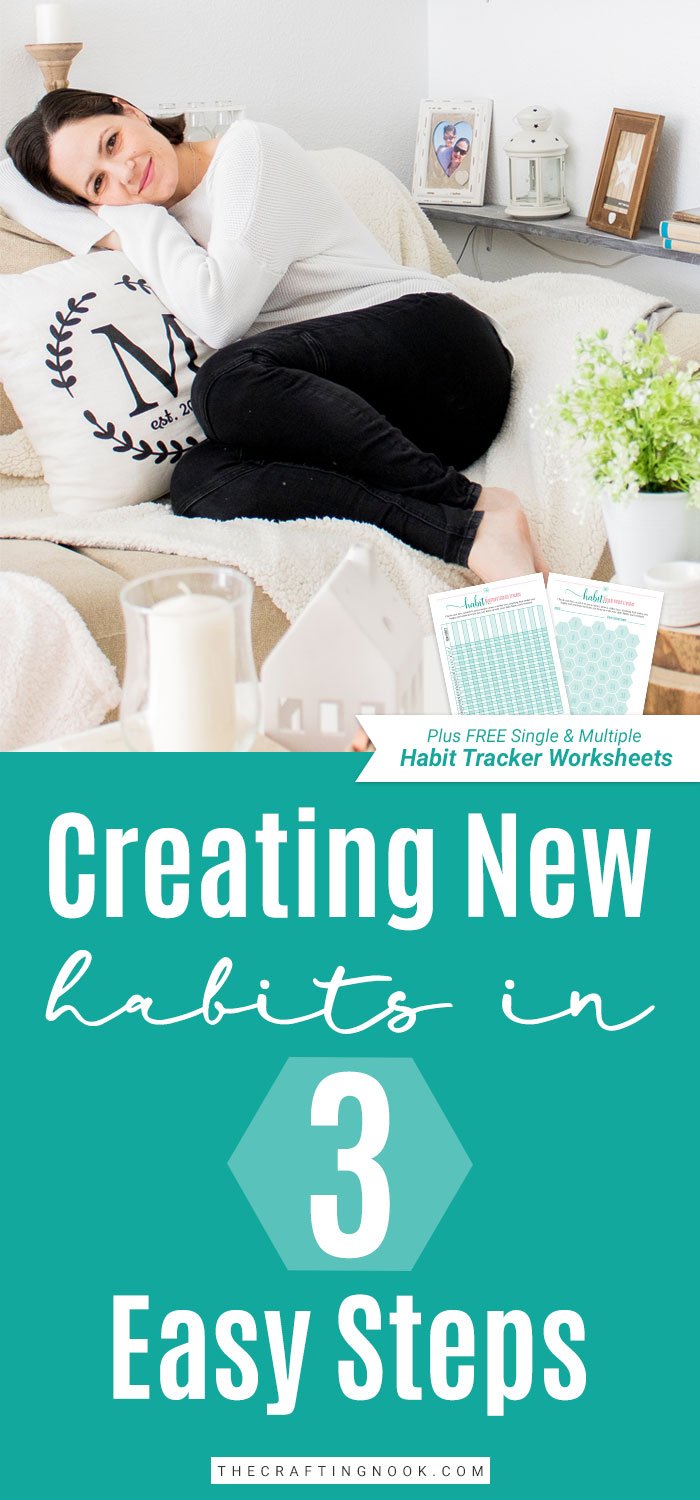
Til’ next time…

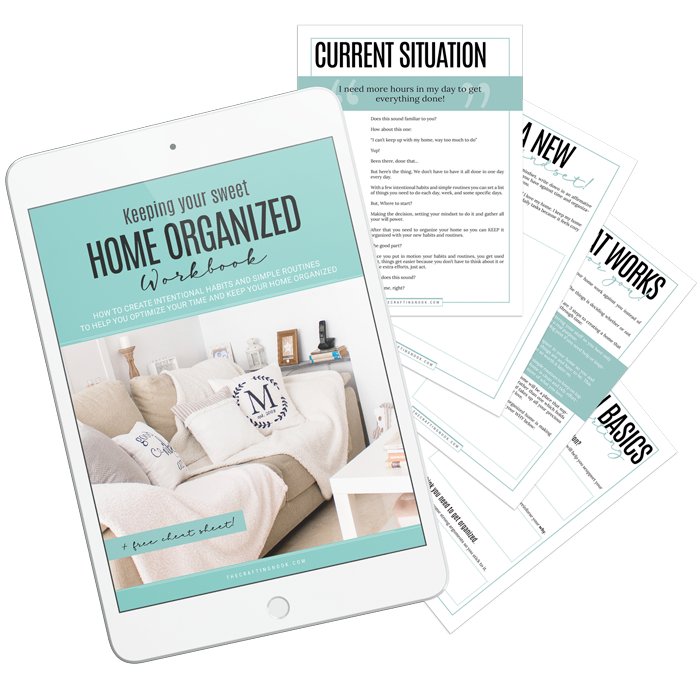
FREE WORKBOOK
Keeping your Sweet Home Organized
Learn how to create intentional habits and simple routines to Keep Your Home Organized. Plus freebies, printables, exclusive content, and tips.
Disclaimer: By clicking on the “Yes” button above you are giving me your consent to collect and use your information according to the law and My Policy Privacy. Zero Spam I promise!


